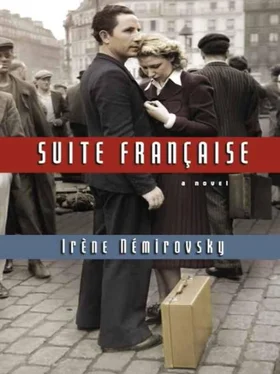Nanny was walking behind Madame Péricand. She seemed mute with terror; her lips were moving but she made no sound. She was holding her fluted bonnet with its cotton ties, newly ironed. Madame Péricand looked at her indignantly. "Really, Nanny, couldn't you have found something more useful to bring? Honestly!" The old woman made an extraordinary effort to speak. She went red in the face, her eyes filled with tears. "Good Lord," thought Madame Péricand, "now she's going mad! Whatever will I do?"
But the harsh voice of her mistress had miraculously returned the gift of speech to Nanny… She replied in her usual tone of voice, simultaneously respectful and bitter: "Madame didn't think I would leave it behind? It's valuable!" This bonnet was a bone of contention between them: Nanny hated the hats she was forced to wear-"so suitable," Madame Péricand thought, "so appropriate for a servant," for she felt that each social class should wear some sign indicative of their station to avoid any misconceptions, just as shops displayed price tags. "You can tell it's not she who does the washing and ironing, nasty old bag!" Nanny would say as she worked. Her hands trembling, she put the lace butterfly of a bonnet on over the enormous nightcap she was already wearing.
Madame Péricand looked at her, thought there was something odd about her but couldn't say exactly what it was. Everything seemed incredible. The world was a horrible dream. She dropped down on to the verge, put Emmanuel back into Nanny's arms and said as vehemently as possible, "Now we have to get out of here," and remained on the ground, waiting for some miracle. There was none, but a donkey pulling a cart passed by. When she saw the driver slow down at the sight of her and her children, Madame Péricand's intuition took over-the intuition innate to the wealthy who can always tell when and where something can be bought.
"Stop!" Madame Péricand shouted. "Where's the nearest railway station? "
"Saint-Georges."
"How long would it take you to get there with your donkey?"
"Well, about four hours."
"Are the trains still running?"
"I've heard they are."
"Good. I'm getting in. Come on, Bernard, Nanny, bring the baby."
"But Madame, I wasn't going that way and what with going and coming back, that'll be at least eight hours."
"You'll be well paid," said Madame Péricand.
She climbed into the carriage, calculating that if the trains were running normally, she would be in Nîmes the next morning. Nîmes… her mother's dear old house, her bedroom, a bath; she nearly fainted at the thought. Would there be enough room for her on the train? "With three children," she said to herself, "I'm sure to manage it." Because of her position as the mother of a large family, Madame Péricand was usually treated like royalty and came first wherever she was… nor was she the kind of woman who allowed anyone to forget what was rightfully hers. She crossed her arms and studied the countryside victoriously.
"But, Madame, what about the car?" Nanny moaned.
"It'll be reduced to ashes by now," replied Madame Péricand.
"What about the trunks, the children's things?"
The trunks had been loaded on to the servants' van. Only three suitcases were left by the time disaster struck, three suitcases full of linen…
"I'll just have to do without them." Madame Péricand sighed, looking up at the sky, picturing once more, as in a wonderful dream, the deep wardrobes in Nîmes with their treasured cambric and linen.
Nanny, who had lost her big trunk with the metal bands and an imitation pigskin handbag, began to cry. Madame Péricand tried in vain to make her see how ungrateful she was being towards Providence. "Remember that you are alive, my dear Nanny; nothing else matters!" The donkey trotted on. The farmer took small side roads thick with refugees. At eleven o'clock they arrived at Saint-Georges and Madame Péricand managed to get on a train heading in the direction of Nîmes. Everyone around her was saying the armistice had been signed. Impossible, some said. Nevertheless, there was no more gunfire, no bombs were falling. "Could this nightmare finally be over?" thought Madame Péricand. She looked again at everything she had brought, "everything she had saved": her children, her overnight case. She placed her hand over the jewellery and money sewn into her blouse. Yes, during this terrible time she had acted with determination, courage and composure. She hadn't lost her head! She hadn't lost… She hadn't… Suddenly she cried out in a choked voice. She clutched her throat and fell backwards, letting out a low moan as if she were suffocating.
"My God, Madame! Madame, what's the matter?" exclaimed Nanny.
"Nanny, my dear Nanny," Madame Péricand finally groaned in a barely audible voice, "We forgot…"
"What? What did we forget?"
"We forgot my father-in-law," said Madame Péricand, dissolving into tears.
Charles Langelet had driven all night long from Paris to Montargis and so had shared in the general misfortune. Nevertheless, he demonstrated great strength of character. In the hostelry where he stopped for lunch, the groups of refugees around him were complaining about the horrors they had encountered on the journey. They looked to him for confirmation, saying, "Isn't that so, Monsieur? You saw it too, didn't you? No one can accuse us of exaggerating!" but he merely replied, drily, " I didn't see anything."
"What? No bombs?" asked the surprised owner.
"No, Madame."
"No fires?"
"Not even a traffic accident."
"Well, lucky you," the woman said after thinking for a moment and shrugging her shoulders doubtfully, as if to say, "He's peculiar!"
Langelet took a bite of the omelette he'd just been served, pushed it away mumbling "inedible," asked for his bill and left. He got a kind of perverse pleasure from depriving these good souls of the satisfaction they hoped to attain by questioning him, for they -vulgar, vile creatures that they were-imagined they were feeling compassion for all mankind, while in reality they were merely thrilled by base, melodramatic curiosity. "It's unbelievable how much vulgarity there is!" Charles Langelet thought sadly. He was always pained and scandalised when he encountered the real world full of unfortunate people who had never seen a cathedral, a statue, a painting. What was more, the happy few, among whom he flattered himself he belonged, displayed the same spinelessness, the same stupidity in the face of misfortune as these common types. Lord! Just think of what these people would make of this "exodus," "their exodus" later on. He could just hear them: " I wasn't afraid of the Germans, not me," an old bag would whine, "I went straight up to them and said, 'This house belongs to the mother of a French officer'-and they didn't say a word." And another woman would say, "Bullets were flying all around me, but it's funny, I wasn't scared, not a bit." It was understood that everyone would embellish their tales with terrifying scenes.
As for Charles, he would simply reply, "That's odd. Everything seemed quite normal to me. There were a lot of people on the road, but that's all." He imagined their surprise and smiled, feeling smug. He needed to feel smug. When he thought about his apartment in Paris, his heart broke. Now and again he turned round towards the back of the car to look lovingly at the crates containing his porcelain, his greatest treasures. There was a Capodimonte group he was worried about: he wondered if he'd put enough wood shavings and tissue paper round it. There wasn't much tissue paper left by the time he'd finished wrapping everything. It was a centrepiece for a table: young women dancing with cupids and fawns. He sighed. In his mind, he thought of himself as a Roman fleeing the lava and ash of Pompeii, abandoning his slaves, his house, his gold, but taking with him, in the folds of his tunic, some terracotta figurine, a perfectly shaped vase, or a bowl modelled on a beautiful breast.
Читать дальше

![Константин Бальмонт - Константин Бальмонт и поэзия французского языка/Konstantin Balmont et la poésie de langue française [билингва ru-fr]](/books/60875/konstantin-balmont-konstantin-balmont-i-poeziya-francuzskogo-yazyka-konstantin-balmont-et-thumb.webp)










